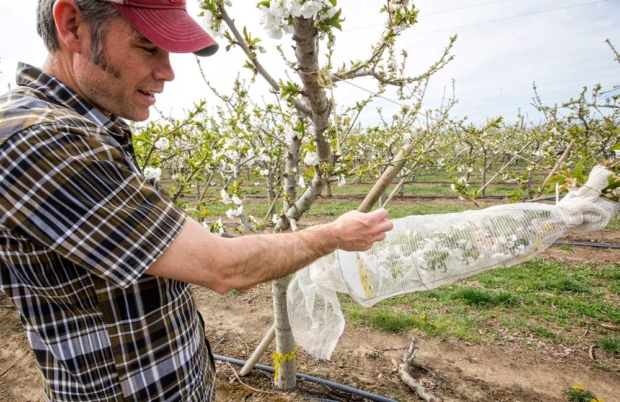
Matt Whiting shows a netted cherry limb in early March 2015 during a mechanical pollination trial held in Prosser, Washington. The netting prevents natural pollination. (TJ Mullinax/Good Fruit Grower)
An ongoing project by Matt Whiting, a Washington State University horticulturist, to develop a system of mechanical pollination has received three more years of funding from the Washington Tree Fruit Research Commission.
Whiting’s idea is to use an electrostatic sprayer with tanks full of pollen stirred into a sticky suspension to pollinate tree fruit. His goal is to someday pollinate without all the uncertainty that comes with relying only on honeybees and other biological pollinators.
“It’s so simple,” he said. “It’s so fundamental.”
Whiting’s project is funded at $232,000 for 2017, 2018 and 2019 to pay for salaries, supplies and travel to trial plots in Washington, California and even Chile.
Whiting, based at the university’s Irrigated Agriculture Research and Extension Center in Prosser, Washington, first received about $61,000 in funding in 2014 and 2015 from the Research Commission and determined that using his suspension and an electrostatic sprayer increased pollen dispersal and fruit set in several trial orchards throughout the state. He called that stage “proof of concept.”
He received no funding in 2016 but continued some unofficial work with enthused growers who wanted to try it themselves. Some even bought their own sprayers.
His upcoming three-year project has several goals:
—Refine the rate and timing of pollen application to improve precision.
—Improve the quality of the suspension. He and his collaborators are trying to fine-tune a solution that will keep pollen viable for about an hour, make it more adhesive to the blooms and improve circulation through equipment. Pollen lasts a long time when dry but degrades quickly when wet.
—Test the efficiency of his suspension in a non-electrostatic sprayer. Pollination involves an electrical charge in nature, so he has been using an electrostatic sprayer in his trials to boost efficiency. Some growers who already own conventional sprayers asked him to test the difference between the two.
—Test the DNA of fruit seeds to track parentage, so he knows which fruits were set by his sprayer and which were set from honeybees or other ambient routes.
—The final goal of his project involves pollen production. If Whiting’s machinery and suspension truly replace bees, the fruit industry will need a source of pollen, a scarce commodity. This spring, he and collaborators are planting three trial blocks of cherry trees and plan to cultivate them solely for pollen, not fruit, and evaluate the production of different horticultural systems.
One of the pollen blocks will be planted at the university’s Roza research orchard north of Prosser and another by a commercial fruit grower and one of Whiting’s collaborators, Whiting said. The other will be in the Yakima area, planted by Firman Pollen. The Yakima company and another research collaborator plan to plant about 9 acres of trees this year and another dozen or so the following year.
“It’s a little bit of an adventure,” said Ryan McClure, whose family owns Firman Pollen. “It’s a little risky.” But the company has trouble keeping up with the demand for pollen for dusting, , the most common current form of mechanical pollination.
In spite of the scientific and engineering challenges of the next three years, Whiting is convinced his method of precision pollination will become the new norm, replacing the fruit industry’s long reliance on honeybees. “I’m 100 percent convinced,” he said. •






Leave A Comment